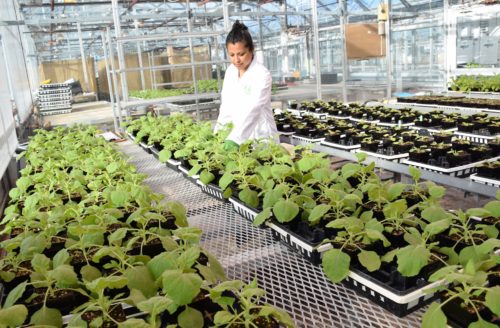
The University of Guelph’s expertise in pharmaceutical plant production is expected to grow thanks to a new $1-million research chair sponsored by PhytoGro Canada, which plans to make and market plant-based medicines.
The PhytoGro Chair in Medicinal Phyto Substances will support development of new medicines from plants, including those made from cannabis. These products are intended to treat symptoms of illnesses and conditions, including cancer, epilepsy, insomnia, multiple sclerosis and post-traumatic stress disorder.
As demand for such medicines grows, the company is eager to collaborate with U of G scientists to cultivate and use medicinal plants as effectively as possible.
“We see U of G’s leading-edge researchers as key partners in achieving our goals to market novel pharmaceuticals derived from plants,” said PhytoGro CEO Ken Clement. “The only way for a plant to be utilized consistently as medicine is for it to be grown in a standardized way, batch after batch. U of G plant scientists have the expertise to achieve that consistency, and we are hoping to gain from their expertise.”
The funds will flow over a five-year period to the University’s Controlled Environment Systems Research Facility (CESRF), where world-leading research and development in plant cultivation is well-established.

“This support from PhytoGro allows us the opportunity to hire new capacity and expand our leadership in research and education on the production of medicinal plants,” said Rene Van Acker, dean of the Ontario Agricultural College.
“PhytoGro has chosen CESRF because of its globally recognized excellence in controlled environment plant production, and the leadership CESRF has shown in developing advanced horticultural technologies for the consistent production of high-quality medicinal plant species.”
The new research chair will support an interdisciplinary, advanced horticultural production program. It will also train graduate and undergraduate students to become future industry leaders.
A world-leading research centre in biological life support, CESRF has pioneered the process of growing food in harsh environments, including space. It is also a leader in optimizing the medicinal properties of plants such as cannabis.
The chair will help U of G researchers learn more about cannabis and other healing plants, said environmental sciences professor Mike Dixon, director of CESRF.
“We are about to be the world’s leading research venue for phyto-pharmaceutical applications.”

Growing cannabis to ensure consistent production of medical compounds will be a major focus of the chair’s research, he said. In time, clinical trials will help make cannabis a conventional pharmaceutical commodity.
Said Dixon: “The time is right to set up a research program to start answering just a few of the great many questions that the cannabis plant poses in terms of health, safety and policy. There is such a broad range of aspects to the phyto-pharmaceutical industry sector that no one has touched yet.”
As cannabis has been illegal in Canada for almost a century, very little is known about its properties, he said. Legalization gives scientists an opportunity to learn more about the plant.
“There is so much we don’t know about the chemistry, biology, the pharmaceutical applications and just exactly how to grow it so it generates a consistent profile of medical compounds,” Dixon said. He said CESRF technology developed for space exploration – specifically for growing plants to produce standardized nutritional compounds – applies equally to plant pharmaceuticals.